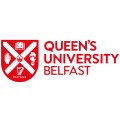 Newborn piglets face a particular challenge—their mother, or sow, often has fewer teats than the number of piglets in the litter. Up to one in four piglets die before finishing nursing, a high preweaning mortality rate driven by multiple factors. This not only presents economic challenges for producers but takes an emotional toll on caretakers and raises animal welfare concerns.
Newborn piglets face a particular challenge—their mother, or sow, often has fewer teats than the number of piglets in the litter. Up to one in four piglets die before finishing nursing, a high preweaning mortality rate driven by multiple factors. This not only presents economic challenges for producers but takes an emotional toll on caretakers and raises animal welfare concerns.
Dr Niall McLaughlin, Professor Ilias Kyriazakis are part of a cross-disciplinary, multi-institution research team using artificial intelligence (AI) to better understand piglet feeding patterns. Their goal is to develop solutions to reduce preweaning mortality, improve production efficiency, and ensure the welfare of all piglets.

We are very excited to start this project. Our overall goal is to improve piglet welfare by using computer vision and artificial intelligence to monitor the sow and her piglets to help inform improved animal husbandry practices”, says Dr McLaughlin.
The Department of Agriculture, Environment and Rural Affairs of Northern Ireland (DAERA) has awarded Dr McLaughlin and Prof Kyriazakis funding over four years for the proposal “IDEAS Tripartite: Automated Piglet and Sow Monitoring for Early Detection of At-Risk Piglets”.
This project is one of 11 selected for the Inter-Disciplinary Engagement in Animal Systems (IDEAS) program, which supports integrated research and outreach projects focused on precision animal management, the environmental impacts of animal production, and the societal aspects of animal welfare.
Dr McLaughlin and Prof Kyriazakis’ collaboration was first enabled by funding from the QUB Proof of Principle scheme and the Momentum One Zero-led GII Pilot Project/BRCD Pump-Priming fund to develop a technology demonstrator system for pig welfare monitoring using video analytics.
The IDEAS Tripartite Team
This international team, or tripartite, led by Dr Madonna Benjamin of Michigan State University College of Veterinary Medicine, is made up of global leaders from North America, the Republic of Ireland, and Northern Ireland, specializing in computer vision, data-driven technologies, sustainable animal production, global food security, production animal welfare, and piglet and sow nutrition and welfare. With research sites in three countries, the team will collect data from farms using diverse husbandry methods, including the free-farrowing pens used in Ireland.
The IDEAS Tripartite: Automated Piglet and Sow Monitoring for Early Detection of At-Risk Piglets team includes: Drs. Ilias Kyriazakis and Niall McLaughlin from Queen’s University Belfast; Dr. Ramon Muns from the Agri-Food and Biosciences Institute in Belfast; Drs. Edgar Garcia Manzanilla and Laura Boyle from the Agriculture and Food Development Authority of the Republic of Ireland; Drs. Monique Pairis-Garcia, Mark Knauer, and Eduardo Beltranena from North Carolina State University; Dr. Tami Brown-Brandl from the University of Nebraska-Lincoln; Dr. Russ Hovey from the University of California, Davis; Dr. Chantal Farmer from the Sherbrooke Research and Development Centre of Agriculture and Agri-Food Canada; and Drs. Beth Ferry, Daniel Morris, and Madonna Benjamin from Michigan State University.
This work is being supported by a research grant from the Department of Agriculture, Environment and Rural Affairs Northern Ireland under the US-Ireland R&D Partnership Programme, the USDA National Institute of Food and Agriculture, and Ireland’s Department of Agriculture, Food and the Marine.
8 October, 2024 - Queen’s University Belfast


